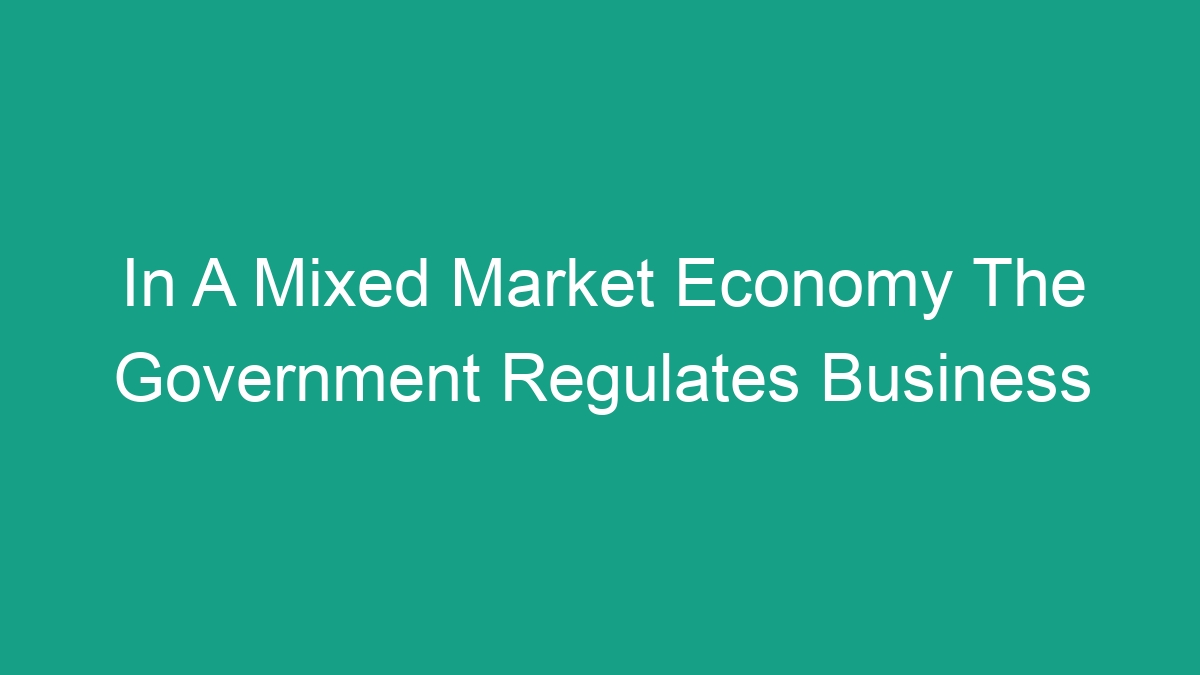
When it comes to economic systems, there are several different types that exist around the world. One of the most common types is a mixed market economy, which combines elements of both capitalism and socialism. In a mixed market economy, the government plays a crucial role in regulating business activities to ensure fair competition, consumer protection, and overall economic stability.
What is a Mixed Market Economy?
A mixed market economy is a system that incorporates elements of both capitalism and socialism. In this type of economy, the government and the private sector coexist, with each playing a distinct role in the economic decision-making process. While the private sector is responsible for producing goods and services and making a profit, the government steps in to regulate certain aspects of the economy to promote fairness and protect the interests of the public.
Government Regulation in a Mixed Market Economy
In a mixed market economy, the government has several key functions when it comes to regulating business activities. These functions include:
1. Consumer Protection: The government implements laws and regulations to protect consumers from unfair business practices, such as fraud, false advertising, and unsafe products. These regulations are designed to ensure that consumers have access to accurate information and can make informed purchasing decisions.
2. Competition Policy: The government enforces competition laws to prevent monopolies and promote fair competition in the marketplace. This helps to create a level playing field for businesses of all sizes and encourages innovation and efficiency.
3. Environmental Regulation: The government sets and enforces environmental standards to minimize the negative impact of business activities on the environment. This includes regulations related to pollution, waste management, and conservation efforts.
4. Labor Standards: The government establishes and enforces labor laws to ensure fair treatment of workers, including regulations related to minimum wage, working hours, workplace safety, and employee rights.
5. Financial Regulation: The government supervises financial institutions and markets to maintain stability and prevent financial crises. This includes regulations related to banking, securities, and insurance to protect consumers and investors.
Role of the Government in a Mixed Market Economy
In a mixed market economy, the government plays a crucial role in balancing the interests of the private sector and the public. While the private sector is responsible for driving economic growth and innovation, the government is tasked with creating a framework of rules and regulations to ensure that businesses operate ethically and in the best interest of society as a whole.
Benefits of Government Regulation in a Mixed Market Economy
The regulation of business by the government in a mixed market economy offers several benefits, including:
Promotion of Fair Competition: Government regulation helps to prevent monopolies and unfair business practices, allowing for fair competition and a level playing field for all businesses.
Consumer Protection: Regulations aimed at protecting consumers from deceptive practices, unsafe products, and unfair pricing ensure that consumers can make informed choices and have a sense of security when interacting with businesses.
Environmental Preservation: Government regulations address environmental concerns and promote sustainability by requiring businesses to adhere to standards that minimize their impact on the environment.
Stability and Security: Financial regulations and oversight of key industries by the government help to maintain stability and prevent economic crises, providing a sense of security for businesses and consumers.
Labor Rights: Regulations related to labor standards ensure that workers are treated fairly and have access to safe working conditions and fair compensation.
Challenges of Government Regulation in a Mixed Market Economy
While government regulation in a mixed market economy offers numerous benefits, it also presents certain challenges, including:
Compliance Costs: Businesses must allocate resources to ensure compliance with various regulations, which can be costly and time-consuming.
Potential for Bureaucracy: Excessive regulation can lead to bureaucracy and inefficiencies, potentially stifling innovation and economic growth.
Inconsistent Enforcement: In some cases, regulations may not be consistently enforced, leading to unequal treatment of businesses and consumers.
Balancing Act: The government must strike a balance between regulating business activities and allowing for entrepreneurial freedom and innovation.
Conclusion
In a mixed market economy, the government plays a critical role in regulating business activities to ensure fairness, protect consumers, and promote overall economic stability. Through the implementation of various laws and regulations, the government aims to create a level playing field for businesses, while also addressing environmental, labor, and financial concerns. While government regulation offers numerous benefits, it also presents challenges that must be carefully managed to create a healthy and thriving economic environment.
Ultimately, in a mixed market economy, the collaborative efforts of the government and the private sector are essential for fostering sustainable economic growth and promoting the well-being of society as a whole.



